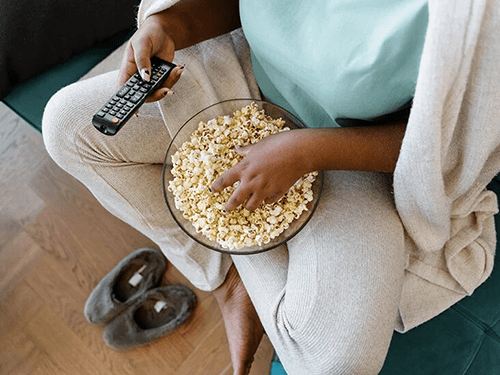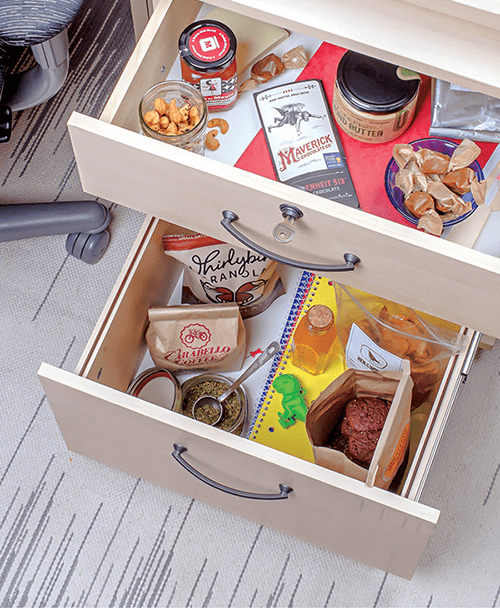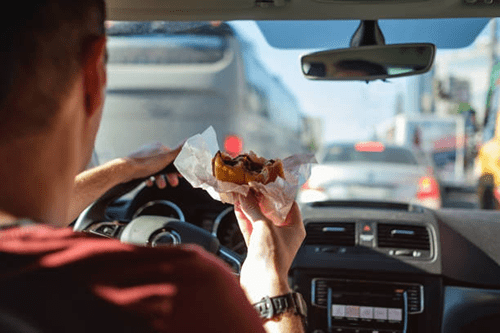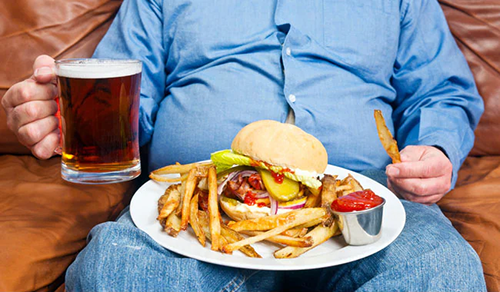Does emotional eating, junk-food binges or nighttime snacking sound familiar?
Let’s try break them with these tips and see some quick weight loss results.
Its not just will power, or the lack thereof that makes us overeat and gain those extra ponuds. Sometimes its that sneaky little habit we’ve developed without even realising it. Like dashing out the door without having had breakfast, mindless snacking in front of our favourite TV shows, and the next thing we know, one little bad habit has led to a lot of unwanted weight gain. The worst thing is we might not even realize what we’re doing to our diets.
Here are some quick tips for some of the most common, bad eating and lifestyle habbits we develop that help us in packing on those unwanted pounds.
Mindless Eating

Cornel University food psychologist, Brain Wansink, PHD, discovered that the larger and heavier the plate or bowl we eat from, the more unknowingly we consume. In one study he found that moviegoers given extra-large containers of stale popcorn, still ate 45 percent more than those snaking on fresh popcorn out of smaller containers holding the same amount of popcorn.
The tip:
Eat from smaller, lighter plates or bowls. So, swop that dinner plate for a salad plate and never eat straight out of the container or packaging.
Nighttime Refrigerator Raids

The old folklore suggests that eating at night is never a good idea if we want to lose weight. Although many experts are of the opinion that’s pure myth, a new animal study done by the Northwestern University backs up the idea that it’s not only what we eat, but also when we eat that counts. In the study, they found that mice given high-fat foods during the day, when these nocturnal animals are supposed to be sleeping, gained significantly more weight than the mice they gave the same high-fat foods to at night.
The tip:
After dinner, teach yourself to think the kitchen is closed for the night. Brush your teeth as you’ll want to eat less with a newly cleaned mouth. If a craving hits, wait 10 minutes and if you’re still hungry, reach for something small, like a fruit.
Endless Snacking

A bad habit many of us are guilty of, snacking round-the-clock, and often on high calorie foods, empty of carbs. A recent study by the University of North California found that this isn’t just a problem in adults, kids are snacking more and more, often on unhealthy junk foods like salty crisps, sodas and candy.
The Tip:
Keep only healthy snacks within reach, such as hummus, carrots and cucumber slices, air–popped popcorn, yoghurt, and almonds suggests Jessica Crandall Snyder, RD, a spokeswoman for the Academy of Nutrition and Dietetics and founder of Vital RD. Don’t stock the desk drawer and pantry with crisps or cookies we know we can’t resist.
Skipping Breakfast

Breakfast is the most important meal of the day, but with so many other tasks competing for our attention in the morning, we may end up with no time, so we decide to skip it. When we skip meals, our metabolism begins to slow, Snyder explains, plus breakfast gives us that boost of energy needed to take on our day. Without this fuel, chances are, we’ll just overeat later. A study published in the Nation Library of Medicine of Japanese school children, found that those who skipped breakfast gained significantly more weight over the two-year period of the study, than those who had their regular morning meals.
The Tip:
“Have ready healthy breakfast foods you can consume on the run”, Snyder says. When we’re rushed, try easy items like whole fruits, yoghurt, homemade cereal bars and smoothies.
Emotional Eating

That bad day at the office, and when we get home, we open the refrigerator and eat all that’s in sight, not a good diet strategy. “You put food in your mouth as a coping mechanism”, Snyder says. Numerous studies confirm that emotions, both positive and negative, can cause us to eat more than we should, a great weight-loss stumbling block.
The Tip:
“Find a new stress buster”, Snyder says. If you’re stressed out at work, when you get home, take a walk instead of eating, or call a friend who will be empathetic, she suggests, “You can vent and take some stress off your shoulders.” Choose any activity you like, as long as it keeps you out of the kitchen.
Eating Too Quickly

Wolfing down our food, whether we’re snacking or eating our meals, doesn’t give our brains the time they need to catch up with our stomachs. Our brain doesn’t get the signal that we’re full until about 15 to 20 minutes from the moment we started eating. So, if we gulp down our meals in 10 minutes, we could end up eating way more food than we need. A study published in ResearchGate of 4 700 men and woman found that eating too quick, was strongly associated with being overweight.
The Tip:
To slow down our eating, physically put down the fork between bites, take smaller bites, and be sure to chew each bite thoroughly. Also drinking water throughout the meal will help slow us down and feel fuller as we go.
Not Getting Enough Sleep

Not getting enough sleep can ruin our weight-loss efforts, according to study conducted by WebMD. They found that men and women who slept five hours or less a night were more likely to gain weight than those who slept seven hours or more.
The Tip:
Establish a routine and try going to bed and waking up at about the same time every day, even on weekends. Keep the bedroom dark and comfortable, and avoid television and computer screens for at least an hour before bedtime. Need extra motivation to shut off the lights early, remember that the better we sleep, the better the number on the scale in the mornings.
Vegging Out with Video Games

Watching TV, sitting in front of the computer, or playing video games. Not only do we need to worry about mindless snacking, study by the American Journal of Clinical Nutrition found that adolescents who played video games for just one hour a day, ate more during the rest of their days.
The Tip:
Take frequent breaks when in front of the computer. Get up and walk around the room or office every 10 – 30 minutes. When the work day, or the favourite TV show ends, remember to monitor what we eat so we don’t overstuff ourselves.
Junk Food

We all know junk food isn’t good for our waistline, but the effect may be worse than we think. Several animal studies have found that rat’s brains find high-fat, high-sugar foods to be addictive, much like alcohol and drugs.
The Tip:
“The idea isn’t to eliminate those favourite fast-food indulgences from your diet, as that will only make you crave them more”, Snyder says, “The key to weight loss success, is to identify what you really want, and indulge in your favourite fast foods in moderation and as an occasional special treat, not every day.”
Munchies4U does not provide professional dietary advice. If you or someone you care for has special dietary requirements, medical needs or an eating disorder, please seek advice from a registered healthcare professional.
Comments